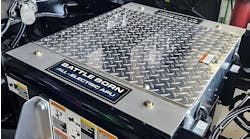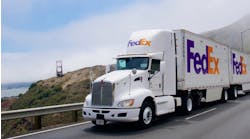There has been a good deal of activity in the development of refrigeration units for trucks and trailers, which is good news for fleets specializing in grocery and food distribution. The demand for ever more precise temperature control is increasing, with customers checking product at delivery, and rejecting loads if the temperature isn't right.
During the past year, Thermo King has introduced three new single-temperature trailer refrigeration units, the SB-300, SB-200 and SB-190. All feature a new ETV that provides fast pull-down, tight temperature control and improved fuel efficiency. Next month, a multi-temp system for the grocery and food service market will be available. With new host unit and remote evaporator, Thermo King says this product offers a significant increase in capacity and airflow, as well as temperature control within ±2 deg. F.
Carrier Transicold's latest entry in trailer refrigeration is the Extra XT, a single-temperature unit for grocery and distribution fleets. Based on the company's Extra reefer platform, the XT provides even tighter temperature control. The unit features TurboAir, an all-new air management system for better airflow and air-throw (velocity), as well as more balanced air distribution. Good air-throw is essential for higher capacity and faster pull-down. Fewer components and less refrigerant charge mean less weight and better fuel efficiency.
Recent developments in truck refrigeration have focused on units for larger vehicles. Carrier's newest entries in straight-truck refrigeration are the Integra 40S and 50S, for trucks up to 18 and 22 ft., respectively. A SlimLine evaporator maximizes cargo space; fewer brazed joints minimize refrigerant leakage; and brushless motors contribute to reduced maintenance. The units feature the mini Cab Command 2 dash-mounted remote control, which lets drivers set and adjust the system from the cab. The units are available in a road-only and 3-ph./230V standby option; a 1-ph. standby option will be launched later this year.
For straight trucks ranging from 18 to 28 ft., Thermo King introduced the TS series of single-temperature units last year. Improvements in fuel efficiency and reliability are achieved primarily through use of an open-drive scroll compressor, which has far fewer moving parts than the more traditional reciprocating compressor. Maintenance intervals on these units have been extended to 2,000 hours, up from 750 on previous units.
Although Thermo King's multi-temp truck refrigeration units currently use reciprocating compressors, increasing demand has spurred R&D efforts in this area.
The development of increasingly sophisticated microprocessor control units has played an important role in providing more precise temperature control, as well as making the job of the driver and service technician easier. Carrier's Advance microprocessor for trailer units has a multi-lingual message center with easy-to-use phrases in English and Spanish rather than codes, for example. A powerful diagnostics function can run pretrip inspections, displaying trouble spots on-screen.
The newest feature, SmartSet, lets users program settings by customer name, cargo type, etc. Drivers only need to type in the product or customer; the multiple refrigeration settings will be done automatically. A handheld printer enables drivers to provide documentation of product protection at delivery, which will be especially important when federal HACCP (hazard analysis critical control points) safety standards are established for transport refrigeration.
Thermo King units have microprocessors that let the user choose a fresh, frozen or deep frozen setting, as well as provide data about the unit's operation. For example, an electronic tag can be placed on the unit itself to store data that can be downloaded by the customer at the end of a day or run to give the user a variety of information about the unit's operation.
As for the future of commercial vehicle refrigeration, environment and energy issues will be the driving forces in the development of new technologies. According to Thermo King, one example is cryogenics, or deep-freeze technology, in which liquid CO2 is passed through a conventional refrigeration system. Advantages to the user: It's “as near as silent” as you can get, and refrigeration capacity is superior to diesel units since it offers much faster recovery. Advantages to the environment are that CO2 occurs naturally and doesn't result in NOx or carbon-type emissions. The primary drawback is the infrastructure required to support it, including a tank for the vehicle and a filling station.
Thermo King is also doing work in the area of fuel-cell technology, although it is not yet economical for transport refrigeration.
FOR MORE INFORMATION, CIRCLE NUMBER ON REPLY CARD:
Carrier Transicold 313
Syracuse, NY
Thermo King 314
Minneapolis, MN


